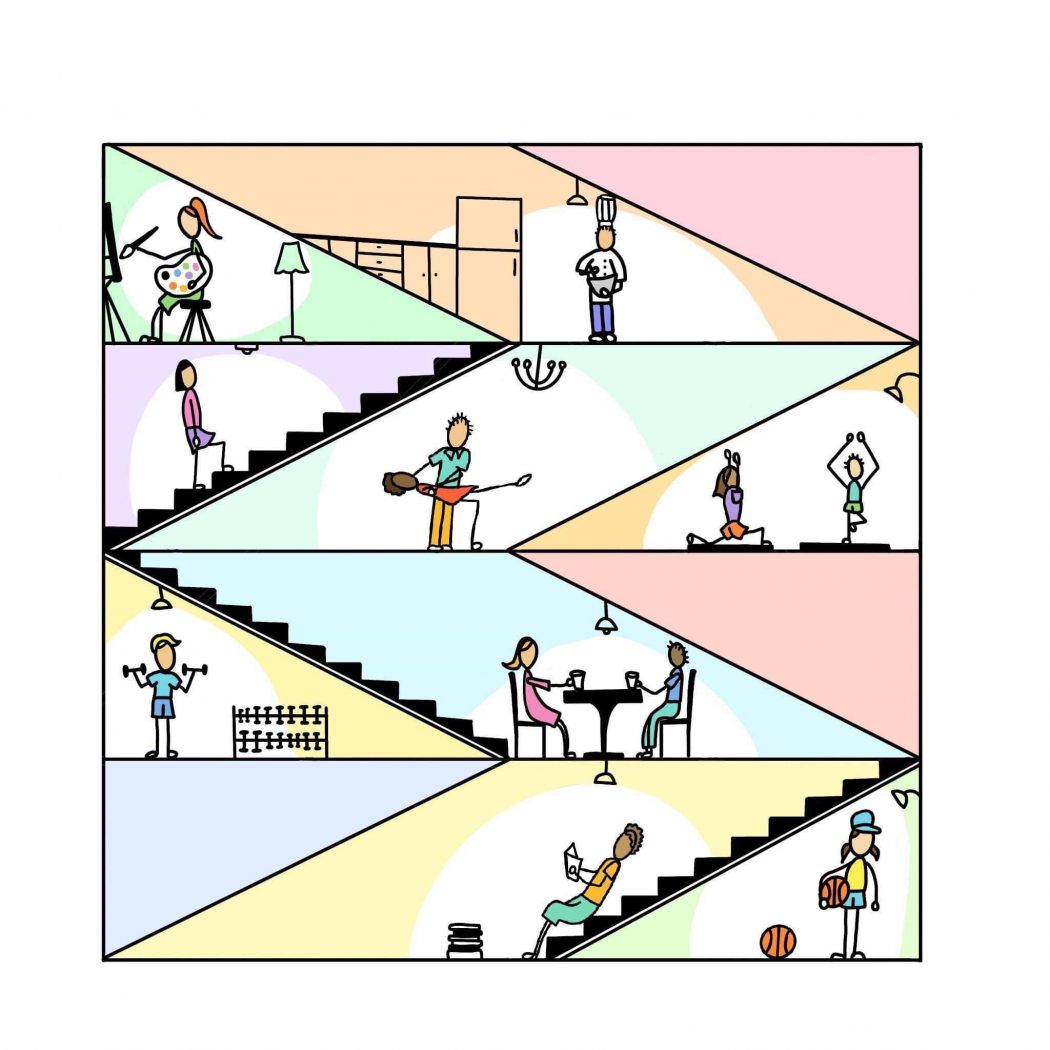To illustrate the diversity of “making it work” stories one might find on McGill campus, the Opinion editors opted to separate their feature article into two smaller pieces.
___
Yes, we’re tired, but at least we’re tired together.
It was a slushy January morning at the Y-Intersection when I realized I needed to pay my first ever visit to the Arts Advising Office. Add/Drop was in full swing, and outside, the campus was checkered with club sign-ups and red bags from Le James. But before I could leap into the new term, I sat on the edge of a more modest bench in the basement of Leacock, seeking much-needed help planning my degree.
When I found myself in front of an advisor half an hour later, I no idea what classes I needed to be taking and was still unsure about which combination of majors and minors was right for me. These two queries frequently spilled over into one another, creating a flood of questions to which I desperately sought answers. The advisor scrolled through my transcript intently, and then, peeling herself away from the screen, she trained her eyes on me.
“You’re doing fairly well.”
I nervously smiled and offered a cautious, “Thanks.”
“You’ve taken a lot of good classes, and you’re on track for the majors you’re thinking about.”
“Great.”
“But,” she continued, a look of concern now contorting her face, “We don’t want you to miss out on fun things in the future just because—because you’re tired.”
At first, I dismissed her remarks. I nodded with artificial appreciation and proceeded with my ramble about course requirements and Honours inquiries. It took virtually an entire semester for me to realize the gravity of her simple phrasing. I wouldn’t miss out on experiences on account of a more clinical-sounding condition, or because my mental health was in some grave state of disrepair. Instead, my advisor reminded me of the obvious, but oft overlooked reality: I would sacrifice my time at McGill simply because I would be constantly, strikingly, and unremittingly tired.
And tired I have been. As a second year student, the transition from a predominantly 200-level schedule up to one mainly comprised of higher-level courses has been tough. The number of pages I have had to churn out about everything from foreign policy to medieval medicine has gotten dizzying. And it’s not like I have the additional pressures of a job or a family to mind, or that I have stupendously over-extended myself with extracurriculars. I simply find myself in the midst of a more mainstream problem, attempting to beat my own exhaustion, and only ever perpetuating it.
Frankly, I cannot preach to you readers in these pages about “making it work.” In a term punctuated by all-nighters and invigorated by enough coffee to kill a small animal, I am still learning how to do that myself. I can’t offer you a recipe for success, but, paradoxically, I think perhaps I can give you just one ingredient. One that has given me some solace during long stints in the library or while holed up in Leacock. It is merely the solemn acknowledgement that everybody—even the person whose words you’re reading right now—sweats the work load sometimes. And that’s okay.
At McGill, where everyone was “smart” in high school, we have a tendency to keep our day-to-day challenges to ourselves. We walk with an air of coolness and competence, but in rare moments, it’s clear that even the student with the most elaborately-doodled bullet journal, whose study hours and eating schedule are all mapped out, gets overwhelmed on occasion. Our school is good, but it’s also hard, and whether academically or otherwise, each of us grapples with that imposing duality in our own way. Maybe, then, suspending our individual prides and recognizing our shared reality is an ironic first step in “making it work.”
In that spirit, consider this story my own little contribution to the boundless mosaic that gradually reveals itself over the course of one’s time at McGill. It’s a composite of dimly lit college bedrooms, each one containing a figure hunched over a laptop, or memorizing lines, or practicing an instrument, or FaceTime-ing family members abroad. It includes students who are cramming under a deadline, and it incorporates, too, those who are raising children or holding down part-time employment while pursuing their studies. Everyone is striving to do something great here, but we are remarkably cagey about the stress that that striving yields along the way. From time to time, we’d do well to remember that yes, we’re tired, but at least we’re tired together.
On the long nights spent finishing readings (or writing articles), I periodically look out on to Durocher, its old victorians dutifully careening over the icy street. In every direction, I see lights on and backpacks on shoulders. I see a student community at work, in quiet synchronicity, forming the body of a school I know I will remember fondly by the time summer arrives. So, to all those who have toiled away at a problem set or a research essay into the wee hours of the morning before, I hope you smile knowing that I was probably awake too.
-Sarah
…………………………..
In hindsight, it should not have been as hard or as drawn-out a decision as it ended up being.
Having wanted to study political science and eventually attend law school since I was first permitted to take an elective in high school, I scrolled through various student groups in my 3-and-a-half foot wide room in Rez and jumped at the opportunity to apply to the McGill undergraduate Moot Court Team — whatever that was.
The application seemed simple enough, and given my (unfounded) confidence in this particular area at the time — I did have one year of experience on the high school Mock Trial team, after all — I figured, naively, that taking on this extra-curricular could only bring about positive consequences. What seemed like an amazing opportunity given my longer term goals ended up teaching me something far more valuable than simply having another experience to slap on my resume. Forgive me in advance for the overly self-righteous cliché, but moot court essentially taught me that sometimes, it’s important to ‘do more with less,’ especially at McGill.
After joining the team, I had to forsake my attempts at actually acclimating to university life. Instead, I was forced to focus most of my energy (and stress) on prepping for weekly Moot Court meetings. Of course, with the gift of retrospection, I see how those meetings and the hard-work they stimulated in me also served as a positive, but with the realities of university academics setting it, it was clear to me then that my studies ought to have taken precedence.
While I managed to muddle through first year in this not-so-great situation, events came to a head in the Fall semester of my second year. I came to the realization that I had not focused enough time on the one thing extremely pertinent to my law school dreams: my university grades. Instead, I was exhausting myself with an extracurricular that was at best helpful, but hardly necessary or sufficient in order achieve those ends. I was stuck in a paradox of sorts; I could either continue with an extracurricular that, in my mind, might help my pursuit of law school but result in average grades, or I could focus on school, yet set aside the extra-curricular relevant to that very pursuit.
In hindsight, it should not have been as hard or as drawn-out a decision as it ended up being. I opted to drop Moot Court, but the acrimonious responses from my teammates and the club executives compounded the stress weighing on my mind, causing me to constantly question whether I had made a grave mistake. As my grades improved, I realized I had not.
This entire series of events guided me through the fraught and difficult process of the law school admission test. I initially failed to get the grade I felt necessary to achieve my post-undergraduate goals because I thought I could breeze through a few weeks of studying before going on vacation and writing the exam. However, rather than allowing a bad situation to fester — as had occurred during my time on the Moot Court team — I refused to allow my poor judgement to define this experience. The following summer, I swore off anything that could even be perceived as a distraction or inhibition to my success on the test, and worked hard enough to achieve my desired score. I realized that I had taken on too much the first time around, and reacted by taking on fewer obligations, focusing on a singular goal, and giving it all my attention. It worked.
I can honestly attest that without the previous experience of failure during the infancy of my time at McGill, I would not have been prepared to cope with the remainder of the ups and downs that the journey to law school had in store. To me, “making it work” is a cumulative experience; it is something we learn throughout our time here, beginning with torment in first year and, hopefully, ending in triumph by fourth. I’m headed to Queens Law in the Fall, but I know I’m taking that McGill grit with me.
-Zach








